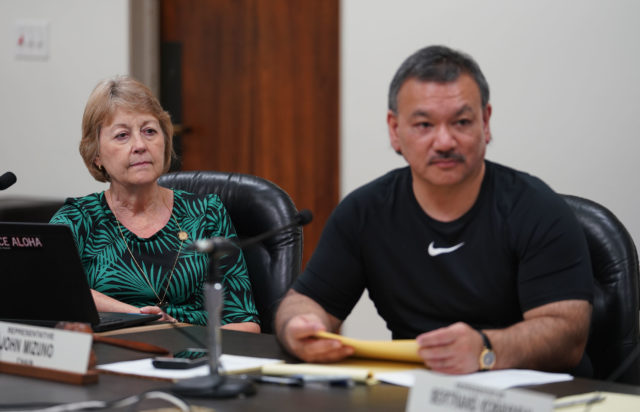Lawmakers from the state House and Senate are racing to regulate the vaping industry, and perhaps go beyond recently announced federal guidelines that will ban some e-liquid flavors.
But those bills will likely run up against big spending by the tobacco industry this legislative session, which begins Jan. 15.
Legislation currently being drafted includes a statewide ban on the sale of flavored e-cigarette products and their distribution as well as a tax on vaping products.
The effort is in response to Hawaii’s high vaping rate among teens.
“It’s such an epidemic and I think people don’t understand how hurtful this is,” said Sen. Roz Baker, who serves as chairwoman of the Committee on Commerce, Consumer Protection and Health.

Last week, they will prohibit the sale of flavored e-cigarette cartridges except for menthol and tobacco flavors, first announced by President Donald Trump in September.
“Trump caved to Big Tobacco when the FDA didn’t restrict the sale of menthol,” said Baker.
Rep. Della Au Belatti, Majority House Leader, said the topic will prompt discussion that “cuts across party lines.”
“Everyone is looking at this because of the huge impact it’s having on kids,” she said. “I think we’re going to have a robust conversation about what to do as a state now that the White House and federal government has taken some action.”
Going Further Than The Feds
Some lawmakers want to go beyond the partial ban by the FDA, which affects closed cartridges and only a portion of products on the market. Some Hawaii lawmakers want a state ban to include vaping devices that have replaceable and customizable open-cartridge systems.
Rep. Scot Matayoshi is making the issue one of his central priorities this session.
“Now that we know that Hawaii is one of the worst off in the nation in terms of youth vaping, so there’s going to be a lot of focus on the flavor ban,” he said. “The federal ban is only on closed tanks or cartridges. My ban doesn’t make that distinction. It would cover everything.”
Hawaii has the highest vaping rate among middle schoolers and the second highest vaping rate among high schoolers in the country, according to data from the .
About 30-35% of high school teens in Kauai, Oahu and Hawaii counties reported vaping at least once a month, compared to the national average of 13%. The Maui county teen vaping rate was 22%.

University of Hawaii researchers say Hawaii’s high vaping rate is partly due to targeted marketing. The tobacco industry spends an estimated $26.3 million annually on marketing its products in Hawaii, according to the U.S. Federal Trade Commission’s .
Baker said she will consider not only raising the cost of e-cigarette products via higher taxes, but also support laws that ensure vaping companies must acquire a permit and license to sell their products from the state Department of Taxation. Currently vape shops are required to register with the Attorney General’s office but are not subject to any permitting by the tax department.
“I know there’s going to be push back because I know tobacco sales are falling,” Baker said.
Rep. John Mizuno, chairman of the House Health Committee, is also in support of restricting the sales and distribution of flavored e-cigarette products, as well as raising taxes on vaping products.
He plans to propose making the shipment of electronic smoking devices unlawful, revise state statute language to mark e-cigarette products as tobacco products and allocate a portion of funds collected from excise taxes to education and prevention programs.
“If we tax the e-cig products, we’re going to make a significant amount of money and we’d fund cessation programs for kids in schools,” Mizuno said.
Attempts to pass similar legislation that would have banned flavored e-cigarettes in 2019 ultimately failed in the House Finance Committee. Rep. Sylvia Luke, chairwoman of the committee, told in October that she’d be in support this session of raising monetary fines for underage users.
Money Fight
Big Tobacco has long had a strong presence in Hawaii.
A Civil Beat analysis of records from the Hawaii State Ethics Commission shows lobbying expenditures by tobacco companies since 2012 have surpassed $1 million. In 2017 and 2018, tobacco and electronic smoking companies spent upwards of $200,000 per year on lobbying, according to the commission’s filings.
“It’s not far fetched to hear those mind-boggling numbers because they’re looking at Hawaii as the key state,” said Mizuno. “Because we’re a small state, sometimes we can be more nimble in passing groundbreaking legislation.”
The largest spenders on lobbying expenditures were tobacco companies Altria and its affiliate Philip Morris, followed by RAI Services, also known as Reynolds American Inc.
In 2018 Altria purchased a 35% stake in e-cig manufacturer Juul, marking its foray into the electronic smoking industry. In Hawaii, Altria spent $155,000 in 2017, $164,000 in 2018 and $108,000 in 2019 on lobbying — expenditures that accounted for approximately 75% of all tobacco company lobbying expenditures each of those years. During the 2019 legislative session between January and May, Juul Labs spent $37,000.
Groups such as the Hawaii Public Health Institute, the American Cancer Society, and the American Lung Association have waged a counter effort and advocated for stricter regulations on the e-cigarette industry.
But the groups have been largely outspent, spending $8,000 to $14,000 on lobbying expenditures each year.

Their anti-vaping efforts recently received a push from Democratic presidential candidate and former New York City mayor Michael Bloomberg, whose to the national campaign for three years.
John Schachter, director of state communications for the national Campaign for Tobacco-Free Kids, said funds would be dedicated to the effort to end the sale of all flavored e-cigarettes, but said he could not specify how much will be spent in Hawaii.
“We’re doing what we can to support the local folks who have done great work on tobacco control. We’re going to counter the industry’s influence,” he said, speaking by phone from Washington, D.C. “We’re up against an industry that has a decades-long record of trying to get youth to use their products so they can continue to generate profits over public health.”
Other cities and states have recently passed similar flavor bans and e-cigarette regulations, sometimes through ballot measures, despite large lobbying efforts by the industry to thwart them.
Last year in San Francisco, for example, tobacco company to fight a proposed flavor ban. Voters ultimately approved it.
“We’ve certainly seen Juul and Altria getting involved in flavor campaigns,” Schachter said. “It’s never a surprise to see them put in millions to protect their billions. Obviously they realize that the flavor ban goes directly at the heart of the problem and the heart of their profits.”
In November, on the sales of flavored tobacco products including menthol cigarettes and e-cigarette products, making it the first state in the country to instate such a broad-reaching move.
Many Hawaii lawmakers have received campaign contributions at various amounts from tobacco companies and their lobbying representatives.
Local lobbying representatives for Altria in Hawaii did not respond to a request for interview for this story.
Baker was optimistic about the chances of passing new regulations this session.
“Hawaii has a pretty good record of trying to put good health legislation on the books,” said Baker, pointing to the Aloha State’s passage of laws that restrict e-cigarette and tobacco sales to people 21 and older in 2016, as well as including e-cigarettes in restrictions on smoking in public places.
 Sign up for our FREE morning newsletter and face each day more informed.
Sign up for our FREE morning newsletter and face each day more informed.
We need your help.
Unfortunately, being named a finalist for a Pulitzer prize doesn’t make us immune to financial pressures. The fact is, our revenue hasn’t kept pace with our need to grow,Ěý.
Civil Beat is a nonprofit, reader-supported newsroom based in ±á˛ą·É˛ąľ±Ę»ľ±. We’re looking to build a more resilient, diverse and deeply impactful media landscape, and we hope you’ll help by .
About the Author
-
 Eleni Avendaño, who covers public health issues, is a corps member with , a national nonprofit organization that places journalists in local newsrooms. Her health care coverage is also supported by , , and . You can reach her by email at egill@civilbeat.org or follow her on Twitter at .
Eleni Avendaño, who covers public health issues, is a corps member with , a national nonprofit organization that places journalists in local newsrooms. Her health care coverage is also supported by , , and . You can reach her by email at egill@civilbeat.org or follow her on Twitter at .



